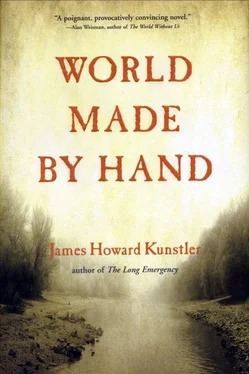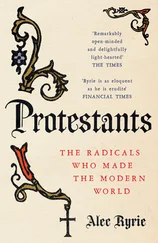Their garage had originally started out as a carriage barn when the place was first built in the 1870s. It was upgraded to a garage sometime in the 1920s, and the original cupola was removed. I was converting it back to a barn now. It required a new cupola because the hayloft needed to be well ventilated. Larry and Sharon had plans to acquire a horse of their own. Larry bartered with most of his patients. I was one of his patients, of course. Sometimes he paid me in dental work and sometimes in cash money. Under the circumstances, they lived well.
“I’ve heard about your recent exploits, Robert,” he said, “so there’s no pressure at this end. And it’s nice to have the water back on again too, thank you very much.”
“You can thank New Faith. And Bullock for making the pipe. I just came by to check in, let you know you were not forgotten.”
I stood there watching him tie off some more vines. Something seemed wrong because usually Larry was a much more voluble person, always ready to palaver.
“We missed you over at the levee last night,” I said.
“I couldn’t go. A man died in my chair last week.”
He was referring to Greg Meers.
“Yes, I heard. Terrible.”
“It wouldn’t have been decent.”
I was unprepared for what happened next. Larry, a selfpossessed, dignified man of forty-nine with a professorial air and a graceful bearing, just fell apart. He began weeping, quietly at first and then with greater and greater vehemence. After a while, he put his fists up against his ears, like a little boy protecting himself against a flurry of physical blows, and keened in the utmost despondency. Finally he put his head down against ground, like a Muslim at prayers, and sobbed into the dirt. I crouched down beside him to try to give him some comfort, but I honestly didn’t know what to say. I just patted him on the shoulders. Bogie, the dog, tried to nuzzle him. Larry kept at it for a couple of minutes, and then with equally surprising suddenness pulled himself together. I stayed there with him. He eventually kneeled upright again, sniffled some, dried his cheeks with each sleeve, and finally gave a big fraught sigh as if letting go of all that emotion.
“It got to me, Robert,” he said.
“I guess it did.”
“He appeared healthy. He just slipped away.”
“Nobody’s blaming you.”
Larry let out another tortured sigh. “I don’t know if I can practice anymore.”
I listened to the birds and insects for a moment, noticing that the peas in one of the raised beds had about gone by. He had peppers coming along nicely in another bed.
“We don’t have another dentist in town, Larry.”
He was scribing in the dirt with a pair of Japanese garden shears that he had probably gotten from some fancy mail-order catalog in the old days. In his other hand he held a bunch of cloth ties, torn from some old rags, which he was using to secure his tomatoes to their stakes.
“He needed a root canal so I had to put him under pretty deep,” Larry said. “I finished the damn tooth before I even realized he wasn’t breathing anymore. Man, when I got out of dental school, we had no idea what we were in for. All that fabulous high-tech stuff we took for granted, gone! Now I’ve got to put patients under crude general anesthesia and drill with a damned foot treadle. It’s madness. You know, what really bothers me is the thought that I’m going to lose some little kid the same way. There’s no precision with these crude opiates.”
“It’s better than nothing, isn’t it?”
“The effective dose is sometimes close to the lethal dose,” he said.
“Even back in the old days, in the big hospitals, the docs lost patients,” I said. “What they gained in technological magic, they lost in bureaucracy and inattention and sloppiness.”
“Dentists didn’t lose patients,” he said. “This is not thoracic surgery.
“Well, whatever else is happening, you’ve still got your knowledge and skill. And the people here in town aren’t dying of simple abscesses.”
Larry resumed tying up his tomato vines.
“This Greg Meers had a couple of kids,” he said. “God knows what happens to them now. There’s no social safety net. There’s nothing.”
“He used to run with Wayne Karp’s bunch,” I said. “The wife too. Maybe they’ll end up back there, in Karptown.”
Larry glanced up at me.
“They came around here last night,” he said. “Wayne Karp. And two of his cronies.”
“Tell me about it.”
“Sharon and I were back here in the garden, sitting outside around sundown. Bogie ran barking around the front of the house. I went in from the back and found Wayne on the entrance portico with his, uh, associates, when I opened the front door.”
“Did they seem surprised to find you at home?”
“Actually, I assumed at first that they came over because of what happened to Greg Meers. I was afraid they were going to, I don’t know, rough me up, or maybe something worse.”
“Did they do anything?”
“No. But they did seem kind of surprised that I answered the door, now that you mention it. I wasn’t too comfortable finding them there, of course.”
“Did they say what they wanted?”
“They said the town hired them to act as security for the night while everybody went off to Bullock’s and they were just making rounds.”
“Security? That’s a laugh. I sure didn’t hire them. And I’m certain Loren didn’t either.”
“Do you think they were up to no good.”
“Of course they were,” I said.
The more I thought about it, the more pissed off it made me. Now I’d have to go all over town alerting everybody to check and see if any of their belongings had been stolen, and make up some kind of inventory of missing articles, and in any case, sooner or later, I would have to go up to Karptown and have a discussion with Wayne about the whole deal, and about him barging into my house and manhandling Britney, and probably have him arrested-meaning Loren would have to be involved, and that suddenly didn’t seem like a very good idea, since Loren was not exactly a tough guy-and apart from any of this I, at least, would not get back to the job at Larry’s house after all, meaning another day robbed of normality and a day’s pay.
I headed over to the rectory on Salem Street to lay all of this on Loren and see if I could enlist him in going around town and talking to people too. To get there from Larry’s the quickest route was down Main Street. On the corner of Main and Van Buren, there was a nineteenth-century brick building that had not been occupied for years. It had last been an art gallery, back in the old days when the chain stores were still going strong out in the strip malls and the only other commerce left down on Main Street was real estate offices. The art that the gallery had sold was embarrassing-pictures of covered bridges and other nostalgic scenes totally at odds with the reality of the time. Anyway, Brother Jobe was down there on Main and Van Buren this morning with a crew of New Faith men putting the finishing touches on a brand-new barbershop, of all things.
“Morning, Mr. Mayor,” Jobe said. “Heck of a fandango last night, huh?”
“Mr. Bullock can put on the dog, all right.”
“And very nice fiddling too, sir. How’s your old noggin today?”
“Not a hundred percent,” I said. “Yours?”
“Earlier on it felt like it was filled with weevils and hornets, but the good Lord has come through and blew them clean out and filled up the space with fresh air, sunshine, and love of fellow man.”
“That’s nice. I wish he’d do the same for me.”
“Try prayer. It works.”
“Maybe later. What’s going on here?”
Читать дальше












